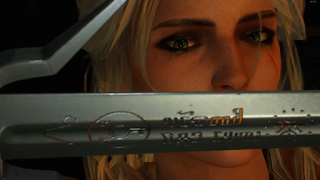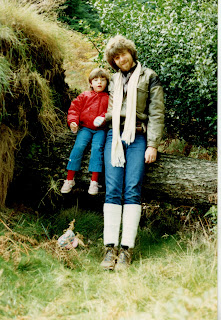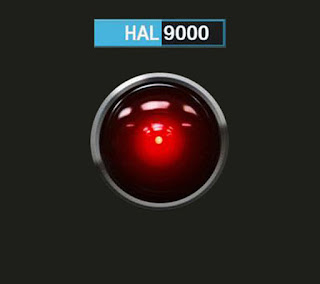 |
| Orrery of the Long Now clock |
Human beings are programmed to believe that nothing much in the world, on a macro scale, will change very much from one year to the next. We call this inductive reasoning, and over the past million years it's served us pretty well. On the whole, tomorrow has been more or less like yesterday; on the whole, next year has been more or less like last. And for most of that time, what lay over the horizon was literally unknowable: oncoming crises, no matter how inevitable, could not be predicted or prepared for.
This is no longer the case. Multiple interlocking crises — the changing climate, the mass extinction of species, the concentration of wealth and power — are changing the world rapidly. We can now see over the horizon; we do now have the tools.
Consequently, you can't now discuss Scotland's politics in isolation from our geopolitical context. I'd identify several key factors:
- There is a strong risk that the UK will diverge sharply from EU over the few months after December 2020;
- There is a strong risk that climate change is running substantially faster than IPCC have allowed for, and that action to mitigate is lagging far behind;
- The new digital propaganda tools by which well-funded actors can manipulate elections are rapidly maturing; and consequently
- There is a strong risk that the English-speaking world is sliding towards something resembling real fascism or at least oligarchy.
For clarity, in saying 'the attack by Russia' I'm not saying that the attack is made solely by Russia, nor that the attack is in the long term interests of the Russian people or state. Rather, it's an attack by an emerging oligarchy, which currently controls Russia. Nor is this oligarchy monolithic; rather, it's made up of a class of ultra-rich individuals who very largely do not see themselves as a collectivity and who very largely do not coordinate their actions, but nevertheless each act 'rationally' to protect and enhance their accummulated wealth and influence.
They include, but are not limited to, those who profited from the ill-managed privatisations in the collapse of the Soviet Union; absolute rulers of oil states in the Arabian peninsula and elsewhere; the hereditary aristocracy of Great Britain, including the House of Windsor; 'tech entrepreneurs' including Gates, Ellison, Zuckerberg, Brin, Page; the financial services elite; and the controllers of major organised crime cartels. These groups, of course, socialise, intermarry, interpenetrate, overlap; that is the nature of a collectivity.
Surrounding the oligarchs themselves — who may or may not be consciously malign — there's a penumbra or Oort cloud of actors who clearly are malign: people like Murdoch, Bannon, Yiannopoulos, Rees Mogg. They are, in a sense, the intellectuals or ideologues of the oligarchy, forging an ideology which allows the oligarchs themselves to 'rationally protect and enhance their wealth and influence', by undermining and destroying the democratic institutions which would otherwise allow mass action to erode those accummulations. But they're not oligarchs themselves, although they may aspire to be; they're hangers on.
One very worrying thought made powerfully by Umair Haque, when he says "climate change accords perfectly with the foundational fascist belief that only the strong should survive, and the weak — the dirty, the impure, the foul — should perish", is that the oligarchs (or their ideologues), rather than putting their shoulders to the wheel to resist climate change, may consciously be seeking to accelerate it.
To say 'but we can't resist these forces' is probably true, but that way leads simply to despair. If human life on earth is to continue, people (including Scotland as a bit-player) must resist these forces, now. It isn't sufficient to go on playing the Westminster game, and, in particular, there isn't time to think about the long game. As John Maynard Keynes said, but with particular force now, in the long run we're all dead.
Pulling focus back to Scotland, what worries me is that the SNP's analysis is as shallow as Politics Galore's. Like the podcast, they believe that the future will be much like the past; like the podcast, they ignore the turbulent geopolitical forces which mean it won't be.
Salmond was a risk-taker; Sturgeon is not. She will play it safe. As the tides of history tear our society and our economy apart, she will wait irresolute for a 'perfect moment' which will never come. The merit of Angus MacNeil's 'Plan B' was not primarily that it actually was a strategy (Sturgeon's wistful hope that she can somehow extract a Section 30 order from a triumphant English Tory government is not), but that it gave us a fresh bite at the cherry with each successive Westminster election.
But there (probably) isn't time. Measurements in Greenland and the Antarctic show that the Climate Emergency is moving much faster than predicted, and meantime the oligarchy and its ideologues are honing its anti-democratic toolkit.
Scotland alone cannot swing the UK back to a path of sanity. We're structurally weak, and, as Johnson gerrymanders the electoral system to lock in Tory majorities, we'll remain structurally weak. Our escape route is to bind ourselves to the European bloc (EFTA or EU), and then to work to strengthen — and radicalise — that bloc; but we cannot do that without independence.
We don't have, for reasons I've given above, much time. You would not have been wise, in 1935, to make any political plan for three electoral cycles hence: the tides of history would have washed it away. 2020 will be 1935 on steroids.
I still believe — and believe strongly — that an independent Scotland could be a positive actor on the world stage, both in seeking to build peace, justice and stability, and in seeking to resist climate change and slow the rate of extinctions. But time is short; the crises are urgent and rapidly becoming more so. If we cannot achieve independence within a very short time frame, it will be time to abandon indulgences like constitutional tinkering and seek to build alliances to defend our planet. Indeed, it may well be that time already.
An independent Scotland on a dead planet would be a very hollow victory.














